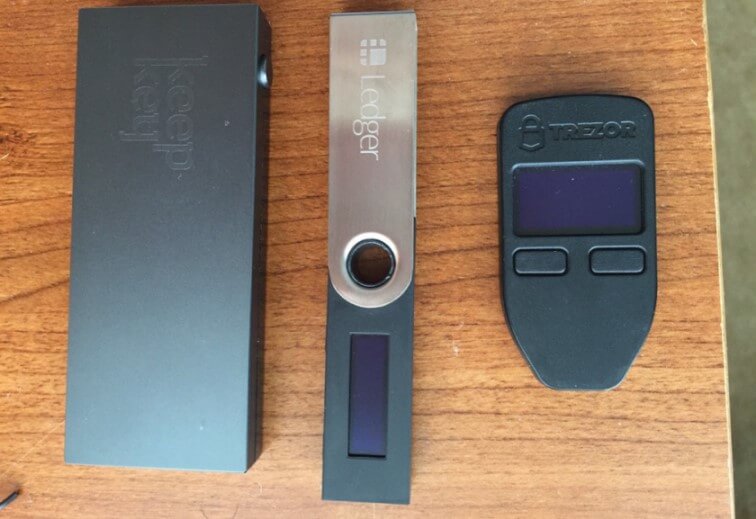Hardware wallets are the gold standard for secure cryptocurrency storage. These small devices allow you to physically store crypto offline and interact with blockchain technology to complete transactions.
Whether you hold one or more cryptocurrencies and tokens, hardware wallets are a great choice since they are able to work with several blockchain platforms at once. Let’s take a look at how hard wallets work, their benefits and disadvantages and the best hardware wallets to help you store and manage your crypto assets.
What is a Hardware Wallet?

Many think of crypto wallets as the literal wallets we regularly use to hold our cash. However, unlike these wallets, crypto wallets don’t hold cryptocurrencies and tokens themselves. At least, not in the way that a physical wallet holds bills and coins.
Cryptocurrency only exists on a blockchain network and when traded moves within this network. The only way of proving ownership of said crypto is through each coin or token’s private key. This is why it is so important to guard your private keys closely, as losing your private keys will result in the loss of your investment.
Crypto Wallets allow you to safely hold digital assets by providing you with a safe solution for storing your private keys. Hardware wallets, considered “cold storage”, allow you to store these keys offline, in a small physical device. As a result, your keys will be better protected from hackers, viruses and malware that can affect wallets that live on a desktop, mobile phone or the web.
Additionally, hardware wallets are protected by a personal PIN and passphrase. Your recovery phrase further protects your keys in the case that your wallet is lost or stolen, since it can be used to recover and transfer your keys to a new device.
Hardware Wallet Pros
Security
Cold storage wallets, or hardware wallets, provide the highest level of security for cryptocurrency storage. Since these wallets are not connected to the internet, they are protected from external threats like hackers and malware. Additionally, hardware wallets come with security measures in place to protect your keys in case your wallet is stolen or lost and allow you to physically sign off on transactions.
Control
Hardware wallets allow you to keep full control over your private keys. Your cryptocurrencies’ keys will be held on your device, which only you can access.
Hardware Wallet Cons
Cost
While most mobile, desktop and web wallets allow you to store crypto free, hardware wallets do come with a higher cost, with some devices surpassing the 100 dollar price tag.
Higher Difficulty
Hardware wallets are not as easy to navigate as some desktop, mobile and web wallets with simple and intuitive user interfaces. Learning to use your hardware wallet might take some time and in general, hardware wallets are considered less beginner friendly.
Best Hardware Wallets
Trezor
Trezor has two different wallets, the Trezor One and Trezor Model T, which are strong contenders in the hardware category and support over one thousand cryptocurrencies and tokens. Both devices boast the standard security features of hardware wallets such as a personal PIN, passphrase and device recovery. The second generation wallet, Model T, has the additional features of including a microSD card slot, a larger color touchscreen and supporting additional tokens.
Trezor also provides an application available for desktop and your web browser. From the Trezor suite, you can keep track of investments stored on your Trezor as well as buy, spend and exchange crypto.
Ledger
Ledger, with its two hardware wallets Nano S and Nano X, is favorite among crypto investors. Wallets are small and feature a screen or navigation (which is larger in the Nano X device) and navigation buttons. Additionally, the second generation wallet, Nano X, can hold more applications and supports Bluetooth connectivity to link your wallet to your mobile device, but comes at double the price.
Ledger wallets connect with the Ledger Live Application available both on desktop and mobile devices. From this platform you can monitor and manage your crypto, while confirming transactions from your physical wallet.
Keepkey
KeepKey is a hardware wallet that allows you to safely store your Bitcoin offline and complete crypto transactions supporting 40 different cryptocurrencies. Security is further enforced with a personalized device pin and a recovery phrase you can use in case of emergency. Its design includes an easy to navigate screen and durable materials, however it is slightly larger than other devices, making it less portable.
Transactions completed with this wallet must be reviewed and approved directly from the device and comes with a USB cable to connect the wallet to your computer.
In terms of cost, KeepKey is right within the price range for other wallets in its category, sold for $79 dollars.
CoolWallet Pro
The CoolWallet Pro is a safe hardware wallet option with convenient credit card dimensions, and water resistant and tamper-proof qualities. It includes features such as encrypted Bluetooth connection for Android and iOS devices and supports Bitcoin, Ethereum, Tezos and over 40 other coins and tokens. Among its best security features this wallet includes a EAL 6+ Military grade security chip, personal PIN and recovery seed. It also enables you to stake your crypto and trade.
In terms of cost, CoolWallet Pro’s price is considered high in comparison to its competitors, sold for $149 dollars.
Finding The Best Crypto Hardware Wallet
Finding the best hardware wallet for you will depend on the diversity of your crypto investments, trading and security needs, budget and personal preferences. Being cold storage devices, all hardware wallets mentioned above provide a high level of security for the storage and management of your crypto assets. Individual features relating to size, desktop and mobile platforms and connectivity, as well as available support, and price can help you choose the best device for you.